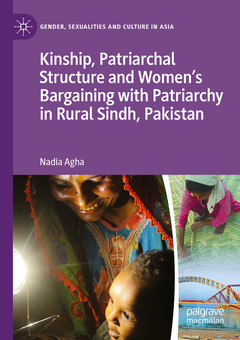Description
Kinship, Patriarchal Structure and Women’s Bargaining with Patriarchy in Rural Sindh, Pakistan, 1st ed. 2021
Gender, Sexualities and Culture in Asia Series
Author: Agha Nadia
Language: English
Subject for Kinship, Patriarchal Structure and Women’s Bargaining...:
Keywords
Publication date: 12-2022
273 p. · 14.8x21 cm · Paperback
Publication date: 12-2021
Support: Print on demand
Description
/li>Contents
/li>Biography
/li>Comment
/li>
The book provides insights into the prevailing patriarchal system in rural Pakistan. It elaborates on the kinship system in rural Sindh and explores how young married women strategize and negotiate with patriarchy. Drawing on qualitative methodologies, the book reveals the strong relationship between poverty and the perpetuation of patriarchy. Women?s strategies help elevate their position in their families, such as attention to household tasks, producing children, and doing handicraft work for their well-being. These conditions are usually seen as evidence of women?s subordination, but these are also strategies for survival where accommodation to patriarchy wins them approval. The book concludes that women?s life-long struggle is, in fact, a technique of negotiating with patriarchy. In so doing, they internalize the culture that rests on their subordination and reproduce it in older age in exercising power by oppressing other junior women.
Dr. Nadia Agha is Associate Professor in Sociology at Shah Abdul Latif University, Khairpur, Pakistan. She has a doctorate in Women’s Studies from the University of York, England. Her recent work has been published in the Asian Journal of Social Science, Journal of Research in Gender Studies, Health Education and Journal of International Women’s Studies.



